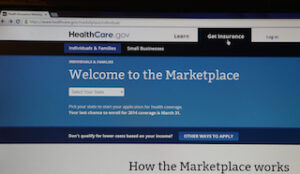Between 25 and 43 million Americans could lose their employer-based health insurance if the unemployment rate hits 20% in the coming months, according to a new report from the left-leaning think tank the Urban Institute.
Citing U.S. Department of Labor statistics, the report notes an estimated 160 million people under age 65 had employer-sponsored insurance (ESI) coverage before March 2020.
In the brief, researchers estimate how 20% unemployment could affect health insurance coverage.
“If the unemployment rate rises to 20%, we estimate that 25 million people will lose their ESI coverage in our base scenario and 43 million would lose ESI in our scenario based on a higher estimate of responsiveness to unemployment rate changes,” the report states.
From March 15-April 25, federal data shows about 30 million workers filed for unemployment. The rising unemployment rate is expected to significantly change the health insurance landscape as more Americans become uninsured or enroll in Medicaid or ACA marketplace plans.
“Among those people losing ESI in our base scenario, we estimate that 12 million (47%) will gain Medicaid coverage, 6 million (25%) will gain coverage through the marketplace or other private plan, and 7 million (29%) will become uninsured,” the report continues.
More from the study:
- More than half of the newly jobless will obtain Medicaid coverage in states that expanded Medicaid under the Affordable Care Act (ACA), while only about one-third will receive Medicaid coverage in the 15 states that have not expanded the program.
- Less than a quarter of these workers and their dependents in expansion states will become uninsured, while about 40% in non-expansion states will become uninsured.
“In California, which expanded Medicaid under the ACA, we estimate that more than 3 million people will lose ESI under a 20% unemployment rate. More than half of people losing ESI would gain Medicaid coverage (1.7 million), about 724,000 would obtain marketplace or other private coverage, and 649,000 would become uninsured,” the report states. “In Texas, which has not expanded Medicaid, we estimate that nearly 2.3 million people would lose ESI coverage if the state’s unemployment rate reaches 20%, of which about half (1.2 million) would become uninsured.”
Some people who lose their jobs and access to employer-based insurance may be newly eligible for Medicaid or marketplace-based subsidized coverage but not realize it, which could contribute to increasing uninsurance.
The report adds several strategies could help prevent this, including:
- increasing state resources directed to outreach and enrollment assistance for Medicaid, CHIP, and the marketplaces;
- increasing awareness that people losing their ESI coverage may be eligible for subsidized coverage through one of these programs;
- creating a national special open enrollment period, regardless of whether a person had prior insurance coverage (currently in effect in 11 states), and providing sufficient staffing to enroll the increased number of people applying midyear;
- and expediting Medicaid expansion in the current 15 nonexpansion states.
Urban Institute researchers suggest several policy options to mitigate burdens on state budgets and the rise in uninsurance, such as temporarily enabling more Medicaid support in non-expansion states, expanding the income range for premium subsidies in the ACA marketplaces, providing subsidies for COBRA insurance, and enhancing Medicaid matching rates.
Supreme Court could overturn Obamacare
The report also mentions that the Supreme Court will soon consider California v. Texas, which could completely overturn the ACA. Depending on the outcome, expanded eligibility for Medicaid, premium subsidies for nongroup insurance coverage, and marketplace plans could be eliminated, along with current regulations requiring enrollment of all applicants regardless of health status and coverage of essential health benefits.
If the ACA is reversed, the report says unemployment would likely lead to much more uninsurance than currently projected, as well as underinsurance, because the benefits covered through nongroup insurance would decrease while cost-sharing requirements would increase.
“Reversing the ACA, and thereby strengthening the relationship between joblessness and uninsurance, would counteract efforts to contain the virus, improve public health, and stabilize the economy,” the report says.













